- Home
- Peter S. Beagle
The Last Unicorn Page 6
The Last Unicorn Read online
Page 6
His voice was lost in a gust of hoofbeats and the clamor of children. A dozen horsemen, dressed in autumn rags, came galloping into the square, howling and laughing, scattering the townsfolk like marbles. They formed a line and clattered around the square, knocking over whatever came in their way and shrieking incomprehensible brags and challenges to no one in particular. One rider rose up in his saddle, bent his bow, and shot the weathercock off the church spire; another snatched up Schmendrick’s hat, jammed it on his own head, and rode on roaring. Some swung screaming children to their saddlebows, and others contented themselves with wineskins and sandwiches. Their eyes gleamed madly in their shaggy faces, and their laughter was like drums.
The round Mayor stood fast until he caught the eye of the raiders’ leader. Then he raised one eyebrow; the man snapped his fingers, and immediately the horses were still and the ragged men as silent as the village animals before the unicorn. They put the children gently on the ground, and gave back most of the wineskins.
“Jack Jingly, if you please,” the Mayor said calmly.
The leader of the horsemen dismounted and walked slowly toward the table where the Councilmen and their guest had dined. He was a huge man, nearly seven feet tall, and at every step he rang and jangled because of the rings and bells and bracelets that were sewn to his patched jerkin. “Evenin’, Yer Honor,” he said in a gruff chuckle.
“Let’s get the business over with,” the Mayor told him. “I don’t see why you can’t come riding in quietly, like civilized people.”
“Ah, the boys don’t mean no harm, Yer Honor,” the giant grumbled good-naturedly. “Cooped up in the greenwood all day, they needs a little relaxing, a little catharsis, like. Well, well, to it, eh?” With a sigh, he took a wizened bag of coins from his waist and placed it in the Mayor’s open hand. “There you be, Yer Honor,” said Jack Jingly. “It ben’t much, but we can’t spare no more than that.”
The Mayor poured the coins into his palm and pushed at them with a fat finger, grunting. “It certainly isn’t much,” he complained. “It isn’t even as much as last month’s take, and that was shriveled enough. You’re a woeful lot of freebooters, you are.”
“It’s hard times,” Jack Jingly answered sullenly. “We ben’t to blame if travelers have no more gold than we. You can’t squeeze blood out of a turnip, you know.”
“I can,” the Mayor said. He scowled savagely and shook his fist at the giant outlaw. “And if you’re holding out on me,” he shouted, “if you’re feathering your own pockets at my expense, I’ll squeeze you, my friend, I’ll squeeze you to pulp and peel and let the wind take you. Be off now, and tell it to your tattered captain. Away, villains!”
As Jack Jingly turned away, muttering, Schmendrick cleared his throat and said hesitantly, “I’ll have my hat, if you don’t mind.”
The giant stared at him out of bloodshot buffalo eyes, saying nothing. “My hat,” Schmendrick requested in a firmer voice. “One of your men took my hat, and it would be wise for him to return it.”
“Wise, is it?” grunted Jack Jingly at last. “And who be you, pray, that knows what wisdom is?”
The wine was still leaping in Schmendrick’s own eyes. “I am Schmendrick the Magician, and I make a bad enemy,” he declared. “I am older than I look, and less amiable. My hat.”
Jack Jingly regarded him a few moments longer; then he walked back to his horse, stepped over it, and sat down in the saddle. He rode forward until he was hardly a beard’s thickness from the waiting Schmendrick. “Na, then,” he boomed, “if you be a magician, do summat tricksy. Turn ma nose green, fill ma saddlebags with snow, disappear ma beard. Show me some magic, or show me your heels.” He pulled a rusty dagger from his belt and dangled it by the point, whistling maliciously.
“The magician is my guest,” the Mayor warned, but Schmendrick said solemnly, “Very well. On your head be it.” Making sure with the edge of his eye that the young girl was watching him, he pointed at the scarecrow crew grinning behind their leader and said something that rhymed. Instantly, his black hat snatched itself from the fingers of the man who held it and floated slowly through the darkening air, silent as an owl. Two women fainted, and the Mayor sat down. The outlaws cried out in children’s voices.
Down the length of the square sailed the black hat, as far as a horse trough, where it dipped low and scooped itself full of water. Then, almost invisible in the shadows, it came drifting back, apparently aiming straight for the unwashed head of Jack Jingly. He covered himself with his hands, muttering, “Na, na, call it off,” and even his own men snickered in anticipation. Schmendrick smiled triumphantly and snapped his fingers to hasten the hat.
But as it neared the outlaw leader the hat’s flight began to curve, gradually at first, and then much more sharply as it bent toward the Councilmen’s table. The Mayor had just time to lunge to his feet before the hat settled itself comfortably on his head. Schmendrick ducked in time, but a couple of the closer Councilmen were slightly splattered.
In the roar of laughter—varyingly voluntary—that went up, Jack Jingly leaned from his horse and swept up Schmendrick the Magician, who was trying to dry the spluttering Mayor with the tablecloth. “I misdoubt ye’ll be asked for encores,” the giant bellowed in his ear. “Ye’d best come with us.” He threw Schmendrick face down across his saddlebow and galloped away, followed by his shabby cohorts. Their snorts and belches and guffaws lingered in the square long after the sound of hooves had died away.
Men came running to ask the Mayor if they should pursue to rescue the magician, but he shook his wet head, saying, “I hardly think it will be necessary. If our guest is the man he claims to be, he should be able to take care of himself quite well. And if he isn’t—why then, an imposter taking advantage of our hospitality has no claim on us for assistance. No, no, never mind about him.”
Creeks were running down his jowls to join the brooks of his neck and the river of his shirt front, but he turned his placid gaze toward the pasture where the magician’s white mare glimmered in the darkness. She was trotting back and forth before the fence, making no sound. The Mayor said softly, “I think it might be well to take good care of our departed friend’s mount, since he evidently prized her so highly.” He sent two men to the pasture with instructions to rope the mare and put her in the strongest stall of his own stable.
But the men had not yet reached the pasture gate when the white mare jumped the fence and was gone into the night like a falling star. The two men stood where they were for a time, not heeding the Mayor’s commands to come back; and neither ever said, even to the other, why he stared after the magician’s mare so long. But now and then after that, they laughed with wonder in the middle of very serious events, and so came to be considered frivolous sorts.
Chapter 5
All that Schmendrick remembered later of his wild ride with the outlaws was the wind, the saddle’s edge, and the laughter of the jingling giant. He was too busy brooding over the ending of his hat trick to notice much else. Too much english, he suggested to himself. Overcompensation. But he shook his head, which was difficult in his position. The magic knows what it wants to do, he thought, bouncing as the horse dashed across a creek. But I never know what it knows. Not at the right time, anyway. I’d write it a letter, if I knew where it lived.
Brush and branches raked his face, and owls hooted in his ears. The horses had slowed to a trot, then to a walk. A high, trembling voice called out, “Halt and give the password!”
“Damme, here we go,” Jack Jingly muttered. He scratched his head with a sound like sawing, raised his voice, and answered, “A short life and a merry one, here in the sweet greenwood; jolly comrades united, to victory plighted—”
“Liberty,” the thin voice corrected. “To liberty plighted. The L sound makes all the difference.”
“Thank ’ee. To liberty plighted. Comrades united—na, na, I said that. A short life and a merry one, jolly comrades—na, that’s not i
t.” Jack Jingly scratched his head again and groaned. “To liberty plighted—gi’me a little help, will ye?”
“All for one and one for all,” the voice said obligingly. “Can you get the rest yourself?”
“All for one and one for all—I have’t!” the giant shouted. “All for one and one for all, united we stand, divided we fall.” He kicked his horse and started on again.
An arrow squealed out of the dark, sliced a wedge from his ear, nicked the horse of the man riding behind him, and skittered away like a bat. The outlaws scattered to the safety of the trees, and Jack Jingly yelled with rage, “Damn your eyes, I gave the password ten times over! Let me only get my hands on ’ee—”
“We changed the password while you were gone, Jack,” came the voice of the sentry. “It was too hard to remember.”
“Ah, you changed the password, did ye?” Jack Jingly dabbed at his bleeding ear with a fold of Schmendrick’s cloak. “And how was I to know that, ye brainless, tripeless, liverless get?”
“Don’t get mad, Jack,” the sentry answered soothingly. “You see, it doesn’t really matter if you don’t know the new password, because it’s so simple. You just call like a giraffe. The captain thought of it himself.”
“Call like a giraffe.” The giant swore till even the horses fidgeted with embarrassment. “Ye ninny, a giraffe makes no sound at all. The captain might as well have us call like a fish or a butterfly.”
“I know. That way, nobody can forget the password, even you. Isn’t the captain clever?”
“There’s no limit to the man,” Jack Jingly said wonderingly. “But see here, what’s to keep a ranger or one of the king’s men from calling like a giraffe when ye hail him?”
“Aha,” the sentry chuckled. “That’s where the cleverness of it is. You have to give the call three times. Two long and one short.”
Jack Jingly sat silent on his horse, rubbing his ear. “Two long and one short,” he sighed presently. “Awell, ’tis no more foolish than the time he’d have no password at all, and shot any who answered the challenge. Two long and one short, right.” He rode on through the trees, and his men trailed after him.
Voices murmured somewhere ahead, sullen as robbed bees. As they drew nearer, Schmendrick thought he could make out a woman’s tone among them. Then his cheek felt firelight, and he looked up. They had halted in a small clearing where another ten or twelve men sat around a campfire, fretting and grumbling. The air smelled of burned beans.
A freckled, red-haired man, dressed in somewhat richer rags than the rest, strode forward to greet them. “Well, Jack,” he cried. “Who is’t you bring us, comrade or captive?” Over his shoulder he called to someone, “Add some more water to the soup, love; there’s company.”
“I don’t know what he is maself,” Jack Jingly rumbled. He began to tell the story of the Mayor and the hat, but he had hardly reached the roaring descent upon the town when he was interrupted by a thin thorn of a woman who came pushing through the ring of men to shrill, “I’ll not have it, Cully, the soup’s no thicker than sweat as it is!” She had a pale, bony face with fierce, tawny eyes, and hair the color of dead grass.
“And who’s this long lout?” she asked, inspecting Schmendrick as though he were something she had found sticking to the sole of her shoe. “He’s no townsman. I don’t like the look of him. Slit his wizard.”
She had meant to say either “weasand” or “gizzard,” and had said both, but the coincidence trailed down Schmendrick’s spine like wet seaweed. He slid off Jack Jingly’s horse and stood before the outlaw captain. “I am Schmendrick the Magician,” he announced, swirling his cloak with both hands until it billowed feebly. “And are you truly the famous Captain Cully of the greenwood, boldest of the bold and freest of the free?”
A few of the outlaws snickered, and the woman groaned. “I knew it,” she declared. “Gut him, Cully, from gills to guilt, before he does you the way the last one did.” But the captain bowed proudly, showing an eddy of baldness on his crown, and answered, “That am I. He who hunts me for my head shall find a fearful foe, but he who seeks me as a friend may find me friend enow. How do you come here, sir?”
“On my stomach,” said Schmendrick, “and unintentionally, but in friendship nonetheless. Though your leman doubts it,” he added nodding at the thin woman. She spat on the ground.
Captain Cully grinned and laid his arm warily along the woman’s sharp shoulders. “Ah, that’s only Molly Grue’s way,” he explained. “She guards me better than I do myself. I am generous and easy; to the point of extravagance, perhaps—an open hand to all fugitives from tyranny, that’s my motto. It is only natural that Molly should become suspicious, pinched, dour, prematurely old, even a touch tyrannical. The bright balloon needs the knot at one end, eh, Molly? But she’s a good heart, a good heart.” The woman shrugged herself away from him, but the captain did not turn his head. “You are welcome here, sir sorcerer,” he told Schmendrick. “Come to the fire and tell us your tale. How do they speak of me in your country? What have you heard of dashing Captain Cully and his band of freemen? Have a taco.”
Schmendrick accepted the place by the fire, graciously declined the gelid morsel, and replied, “I have heard that you are the friend of the helpless and the enemy of the mighty, and that you and your merry men lead a joyous life in the forest, stealing from the rich and giving to the poor. I know the tale of how you and Jack Jingly cracked one another’s crowns with quarter-staves and became blood brothers thereby; and how you saved your Molly from marriage to the rich old man her father had chosen for her.” In fact, Schmendrick had never heard of Captain Cully before that very evening, but he had a good grounding in Anglo-Saxon folklore and knew the type. “And of course,” he hazarded, “there was a certain wicked king—”
“Haggard, rot and ruin him!” Cully cried. “Aye, there’s not one here but’s been done wrong by old King Haggard—driven from his rightful land, robbed of his rank and rents, skinned out of his patrimony. They live only for revenge—mark you, magician—and one day Haggard will pay such a reckoning—”
A score of shaggy shadows hissed assent, but Molly Grue’s laughter fell like hail, rattling and stinging. “Mayhap he will,” she mocked, “but it won’t be to such chattering cravens he’ll pay it. His castle rots and totters more each day, and his men are too old to stand up in armor, but he’ll rule forever, for all Captain Cully dares.”
Schmendrick raised an eyebrow, and Cully flushed radish-red. “You must understand,” he mumbled. “King Haggard has this Bull—”
“Ah, the Red Bull, the Red Bull!” Molly hooted. “I tell you what, Cully, after all these years in the wood with you I’ve come to think the Bull’s nought but the pet name you give your cowardice. If I hear that fable once more, I’ll go and down old Haggard myself, and know you for a—”
“Enough!” Cully roared. “Not before strangers!” He tugged at his sword and Molly opened her arms to it, still laughing. Around the fire, greasy hands twiddled dagger hilts, and longbows seemed to string themselves, but Schmendrick spoke up then, seeking to salvage Cully’s sinking vanity. He hated family scenes.
“They sing a ballad of you in my country,” he began. “I forget just how it goes—”
Captain Cully spun like a cat ambushing its own tail. “Which one?” he demanded.
“I don’t know,” Schmendrick answered, taken aback. “Are there more than one?”
“Aye, indeed!” Cully cried, glowing and growing, as though pregnant with his pride. “Willie Gentle! Willie Gentle! Where is the lad?”
A lank-haired youth with a lute and pimples shambled up. “Sing one of my exploits for the gentleman,” Captain Cully ordered him. “Sing the one about how you joined my band. I’ve not heard it since Tuesday last.”
The minstrel sighed, struck a chord, and began to sing in a wobbly countertenor:
Oh, it was Captain Cully came riding home
From slaying of the king�
�s gay deer,
When whom should he spy but a pale young man,
Came drooping o’er the lea?
“What news, what news, my pretty young man?
What ails ye, that ye sigh so deep?
Is it for the loss of your lady fair?
Or are ye but scabbit in your greep?”
“I am nae scabbit, whatever that means,
And my greep is as well as a greep may be,
But I do sigh for my lady fair
Whom my three brothers ha’ riven from me.”
“I am Captain Cully of the sweet greenwood,
And the men at my call are fierce and free.
If I do rescue your lady fair,
What service will ye render me?”
“If ye do rescue my lady fair,
I will break your nose, ye silly auld gowk.
But she wore an emerald at her throat,
Which my three brothers also took.”
Then the captain has gone to the three bold thieves,
And he’s made his sword baith to shiver and sing.
“Ye may keep the lass, but I’ll hae the stane,
For it’s fit for the crown of a royal king.”
“Now comes the best part,” Cully whispered to Schmendrick. He was bouncing eagerly on his toes, hugging himself.
Then it’s three cloaks off, and it’s three swords out,
And it’s three swords whistling like the tea.
“By the faith of my body,” says Captain Cully,
“Now ye shall have neither the stane nor she.”
And he’s driven them up, and he’s driven them down,
And he’s driven them to and fro like sheep—
“Like sheep,” Cully breathed. He rocked and hummed and parried three swords with his forearm for the remaining seventeen stanzas of the song, rapturously oblivious to Molly’s mockery and the restlessness of his men. The ballad ended at last, and Schmendrick applauded loudly and earnestly, complimenting Willie Gentle on his right-hand technique.

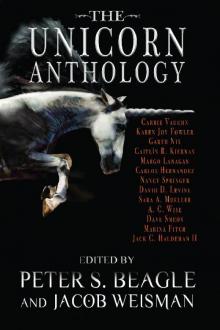 The Unicorn Anthology.indb
The Unicorn Anthology.indb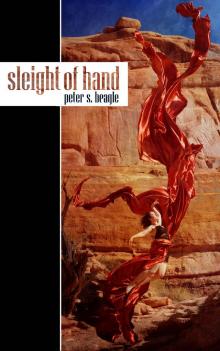 Sleight of Hand
Sleight of Hand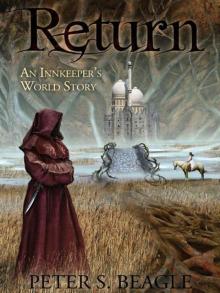 Return
Return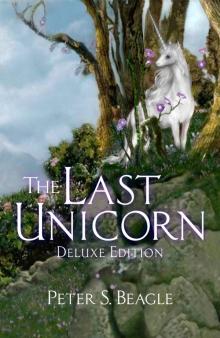 The Last Unicorn
The Last Unicorn Two Hearts
Two Hearts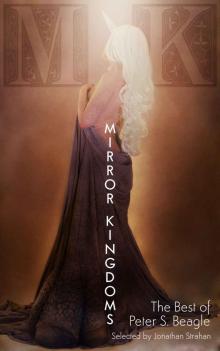 Mirror Kingdoms: The Best of Peter S. Beagle
Mirror Kingdoms: The Best of Peter S. Beagle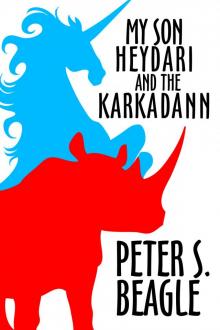 My Son Heydari and the Karkadann
My Son Heydari and the Karkadann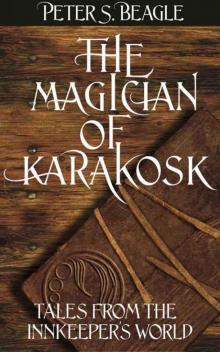 The Magician of Karakosk, and Other Stories
The Magician of Karakosk, and Other Stories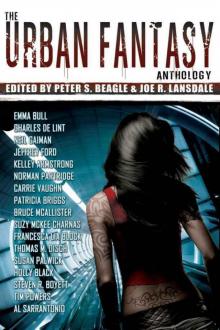 The Urban Fantasy Anthology
The Urban Fantasy Anthology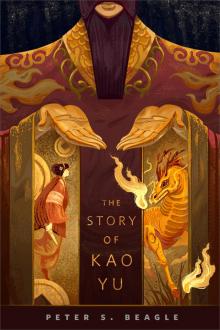 The Story of Kao Yu
The Story of Kao Yu The Karkadann Triangle
The Karkadann Triangle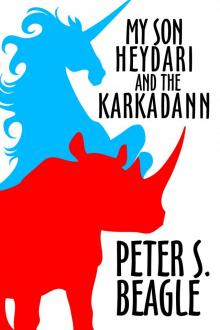 My Son and the Karkadann
My Son and the Karkadann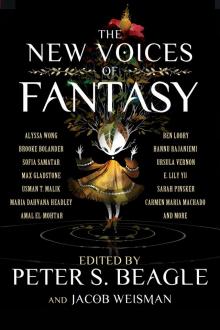 The New Voices of Fantasy
The New Voices of Fantasy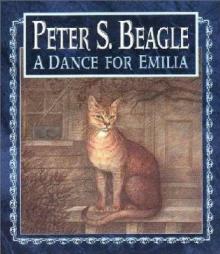 A Dance for Emilia
A Dance for Emilia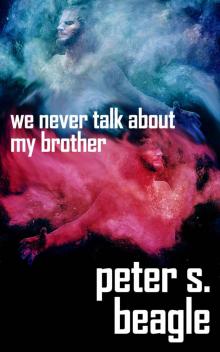 We Never Talk About My Brother
We Never Talk About My Brother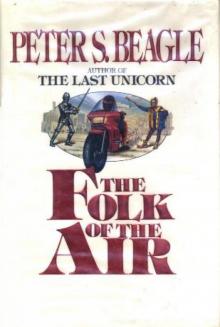 The Folk Of The Air
The Folk Of The Air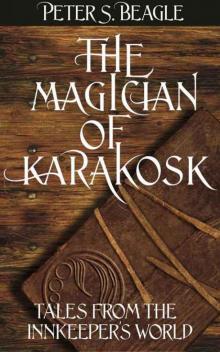 The Magician of Karakosk: Tales from the Innkeeper's World
The Magician of Karakosk: Tales from the Innkeeper's World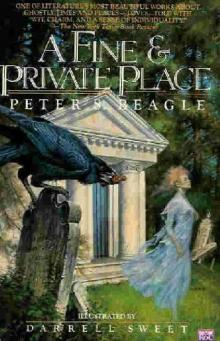 A Fine and Private Place
A Fine and Private Place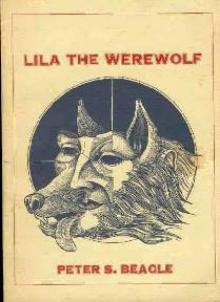 Lila The Werewolf
Lila The Werewolf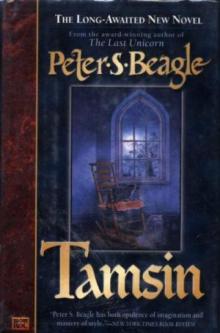 Tamsin
Tamsin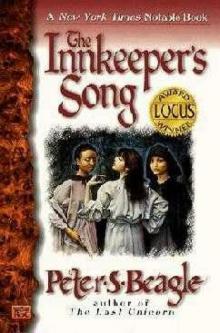 Innkeeper's Song
Innkeeper's Song